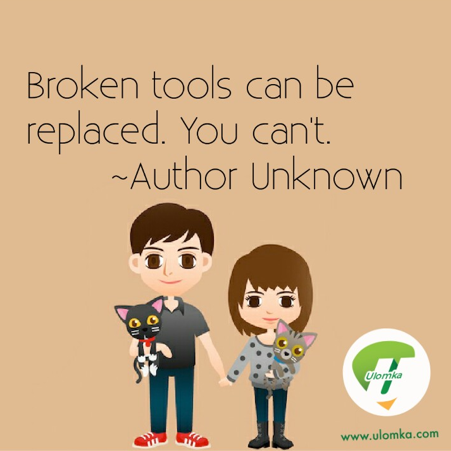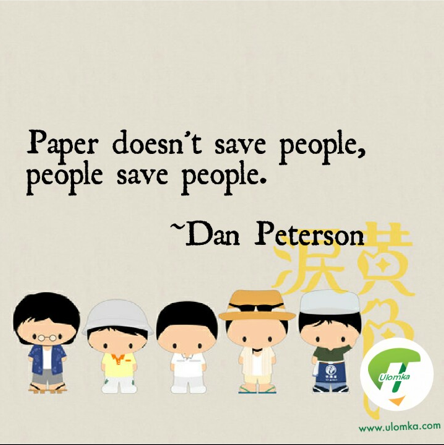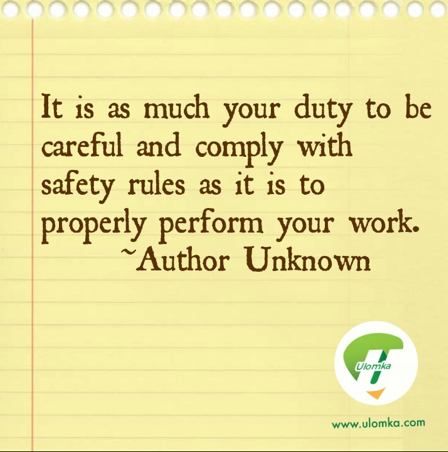“As soon as you see a mistake and don’t fix it, it becomes your mistake”. ~Author Unknown
You’ve perceived your workplace/business is not safety compliant but you have no clue on the next step. As an employee, you might ponder on leaving matters as they are because it’s a tough world out there without a job. Or as a business owner, you think it is either too expensive or beyond your scope.
Pause.
It is important to be alive and in good health to have a source of income as your body is your first tool. You are important to someone and would be irreplaceable if you are gone.

You need to realise your importance in order for you to take necessary action. Safety is the responsibility of both employer and employee. The employer is responsible for providing a safe place of work. The employee is responsible for complying with laid down rules and reporting lapses in the system. As an employee in a workplace that isn’t safety compliant, it might not be that the employer is heartless rather a case of ignorance. Therefore, you need to acquire more information.
The Regulators
In all countries there are regulators and legislations that back up health, safety and the environment to ensure protection of all. In Nigeria, there are different regulators with different portfolios namely:
- Ministry of Labour and Productivity
- Department of Petroleum Resources (DPR)
- National Oil Spill Detection and Response Agency (NOSDRA)
- Federal Ministry of Environment (FMEnv)
- National Environmental Standards and Regulations Enforcement Agency (NESREA)
- Lagos State Safety Commission
- Nigerian National Petroleum Company (NNPC)
What to do?
Arm yourself with knowledge
As an employee/employer you need to find out more about health and safety in the workplace. This blog is a source of information and there are other diverse sources online and in libraries. In Nigeria, the Factory Act (1987, 1990, 2004) is the major legislation that backs up health and safety issues. It covers cleanliness of the workplace, ventilation, lighting, overcrowding, safe use of machinery, use of protective clothing and equipment, provision of drinking water, investigation of incidents and accidents, penalties etc. More detailed information can be found on www.ilo.org
Share newly acquired knowledge
After getting more information, make it go viral. We share jokes, music, pictures why not something that could save our lives? It is possible that there are safety procedures written somewhere but not being complied with. Encourage others through information sharing on the benefits of compliance.

We must remind that a good manner of approach goes a long way here. Do not go confrontational to your boss. Speak politely, show pictures ( we have loads on our various social media platforms) and articles, share contact details of qualified personnel that can help, strike peaceful conversations with your colleagues (remember, it’s not a revolution), ask questions on what should be done in certain hypothetical situations, invite qualified personnel to speak to your staff etc.
Be intentional about your habits
They say practice makes perfect. You might not be used to following safety rules or laid down work procedures, however the good news is, if you make a conscious effort, it becomes a part of you.

Avoid shortcuts in work activities, use personal protective equipment as required, comply with laid down procedures, report faulty equipment, only trained personnel should work on faulty equipment, observe good housekeeping ( a place for everything and everything in its place), ensure spills are mopped, correct co-workers and practice caution everywhere not just in the workplace.
Invite Us
The Ulomka team does not want people to get ill, injured, die on the job or lose investment that is why we help businesses input safety procedures to ensure safe work and reduce loss of any kind. We offer a free general safety awareness training for staff of our clients. We could also provide more specialised training and develop safety procedures depending on the safety gaps in your system.




